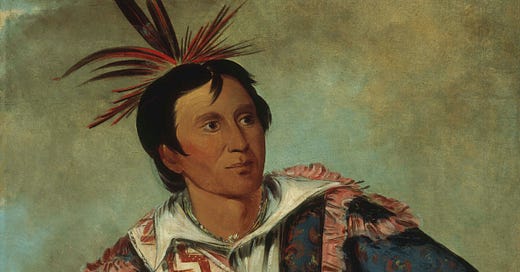"The Choctaw Chief" by Charles Dickens, 1842
"I asked him what he thought of Congress. He answered, with a smile, that it wanted dignity, in an Indian’s eyes."
On his travels through the United States in 1842, described in his book American Notes, Charles Dickens, on board an Ohio River steamship, meets a Choctaw chief.
There chanced to be on board this boat, in addition to the usual dreary crowd of passengers, one Pitchlynn, a chief of the Choctaw tribe of Indians, who sent in his card to me, and with whom I had the pleasure of a long conversation.
He spoke English perfectly well, though he had not begun to learn the language, he told me, until he was a young man grown. He had read many books; and Scott’s poetry appeared to have left a strong impression on his mind: especially the opening of The Lady of the Lake, and the great battle scene in Marmion, in which, no doubt from the congeniality of the subjects to his own pursuits and tastes, he had great interest and delight. He appeared to understand correctly all he had read; and whatever fiction had enlisted his sympathy in its belief, had done so keenly and earnestly. I might almost say fiercely.
He was dressed in our ordinary everyday costume, which hung about his fine figure loosely, and with indifferent grace. On my telling him that I regretted not to see him in his own attire, he threw up his right arm, for a moment, as though he were brandishing some heavy weapon, and answered, as he let it fall again, that his race were losing many things besides their dress, and would soon be seen upon the earth no more: but he wore it at home, he added proudly.
He told me that he had been away from his home, west of the Mississippi, seventeen months: and was now returning. He had been chiefly at Washington on some negotiations pending between his tribe and the government: which were not settled yet (he said in a melancholy way), and he feared never would be: for what could a few poor Indians do against such well-skilled men of business as the whites? He had no love for Washington; tired of towns and cities very soon; and longed for the forest and the prairie.
I asked him what he thought of Congress. He answered, with a smile, that it wanted dignity, in an Indian’s eyes.
He would very much like, he said, to see England before he died; and spoke with much interest about the great things to be seen there. When I told him of that chamber in the British Museum wherein are preserved household memorials of a race that ceased to be, thousands of years ago, he was very attentive, and it was not hard to see that he had a reference in his mind to the gradual fading away of his own people.
This led us to speak of Mr. Catlin’s gallery, which he praised highly: observing that his own portrait was among the collection, and that all the likenesses were “elegant.” Mr. Cooper, he said, had painted the Red Man well; and so would I, he knew, if I would go home with him and hunt buffaloes, which he was quite anxious I should do. When I told him that supposing I went, I should not be very likely to damage the buffaloes much, he took it as a great joke and laughed heartily.
He was a remarkably handsome man; some years past forty, I should judge; with long black hair, an aquiline nose, broad cheek-bones, a sunburnt complexion, and a very bright, keen, dark, and piercing eye. There were but twenty thousand of the Choctaws left, he said, and their number was decreasing every day. A few of his brother chiefs had been obliged to become civilised, and to make themselves acquainted with what the whites knew, for it was their only chance of existence. But they were not many; and the rest were as they always had been. He dwelt on this: and said several times that unless they tried to assimilate themselves to their conquerors, they must be swept away before the strides of civilised society.
When we shook hands at parting, I told him he must come to England, as he longed to see the land so much: that I should hope to see him there, one day: and that I could promise him he would be well received and kindly treated. He was evidently pleased by this assurance, though he rejoined with a good-humoured smile and an arch shake of his head, that the English used to be very fond of the Red Men when they wanted their help, but had not cared much for them, since.
He took his leave; as stately and complete a gentleman of Nature’s making, as ever I beheld; and moved among the people in the boat, another kind of being. He sent me a lithographed portrait of himself soon afterwards; very like, though scarcely handsome enough; which I have carefully preserved in memory of our brief acquaintance.
From American Notes by Charles Dickens, 1842, available on Amazon*
Classic Travel Tales on Facebook
Another travel story from Charles Dickens
*As an Amazon Associate we earn a bit from qualifying purchases.
Image: Há-tchoo-túc-knee, Snapping Turtle, a Half-breed by George Catlin, 1834, Smithsonian American Art Museum, public domain.



